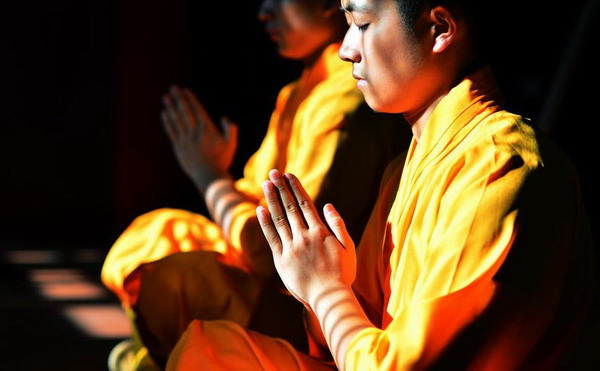Don't mix religious message with individual mistakes
Updated: 2015-08-11 07:55
By Wei Dedong(China Daily)
|
|||||||||
 |
| Monks meditate at the Shaolin Temple in Quanzhou, Fujian province, May 17. [Photo/Xinhua] |
Recent weeks have seen many people accuse Shi Yongxin, the abbot of Shaolin Temple, of many wrongdoings, from corruption to adultery. His case shows religion-related reports are becoming increasingly eye-catching.
Many in China do not practice religion, but despite that they want believers and religious heads to follow high standards. So, whenever something negative is reported about a temple or church, or a monk or a priest, some netizens adopt an attitude of "didn't we tell you they were immoral?" This is reflected in the lopsided negative comments on the Internet.
The truth is, most of the netizens who celebrate the negative reports on religion or religious leaders have never visited a temple, read a Buddhist text or seriously talked with a monk. As a result, they blame the religion for the negative acts of their practitioners.
The law says a person is innocent until proven guilty. So we should not condemn anyone, even if he/she is a monk/nun, simply on the basis of accusations. And even if some religious leaders commit a crime or an immoral act, it doesn't mean the religion he/she practices is bad.
True, the onus is on the authorities to investigate such cases and make the truth public. But people should wait for the truth to emerge instead of jumping to harsh conclusions.
For Buddhists, on the other hand, the better choice is to face reports that could even damage the reputation of the Shaolin Temple, rather than pretend the temple and its monks can do nothing wrong. Besides the law of the country, Buddhism as a religion has its own set of rules, and those breaking them deserve due punishment. Only a transparent religion that is also open to public criticism can gain trust of the people.
As a Buddhist monk, Shi Yongxin is so influential that the accusations against him, if proven true, can definitely damage the reputation of the temple. But one religious head's mistake or immoral act doesn't mean all other religious practitioners are like him.
The Shaolin Temple, on its part, should better reflect on its problems and take steps to solve them. This would be the best defense against rumors and accusations. Controversies surrounding the Shaolin Temple, some false and some true, have been emerging at regular intervals over the past few years. For example, some people in monks' dress inside the temple do cheat tourists by forcing them to buy joss sticks for more than 1,000 yuan ($161) a piece. This has given the temple a bad name. In this regard, at least, the temple needs to take some action to regulate its monks and staff, instead of letting such incidents to continue damaging its reputation.
Shi Yongxin will of course be punished if he is guilty of corruption, but if the accusations against him prove false, those who launched a dirty campaign against him, perhaps with ulterior motives, should be brought to justice.
The author is vice-dean of the School of Philosophy of Renmin University of China.
Related Stories
Shaolin Temple rocked by corruption claims 2015-08-10 16:49
Shaolin abbot misses Bangkok visit amid probe reports 2015-08-04 07:41
'Truth' sought after claims made against Shaolin abbot 2015-07-30 17:25
Should Shaolin be commercialized? 2015-07-29 09:17
Today's Top News
Inspectors to cover all of military
Britons embrace 'Super Thursday' elections
Campaign spreads Chinese cooking in the UK
Trump to aim all guns at Hillary Clinton
Labour set to take London after bitter campaign
Labour candidate favourite for London mayor
Fossil footprints bring dinosaurs to life
Buffett optimistic on China's economic transition
Hot Topics
Lunar probe , China growth forecasts, Emission rules get tougher, China seen through 'colored lens', International board,
Editor's Picks

|

|

|

|

|

|







